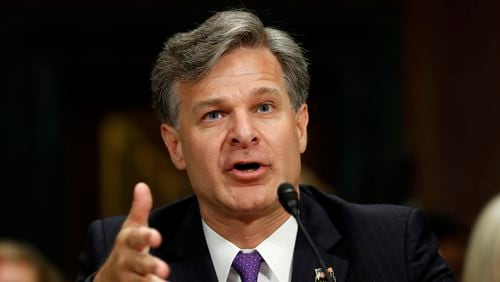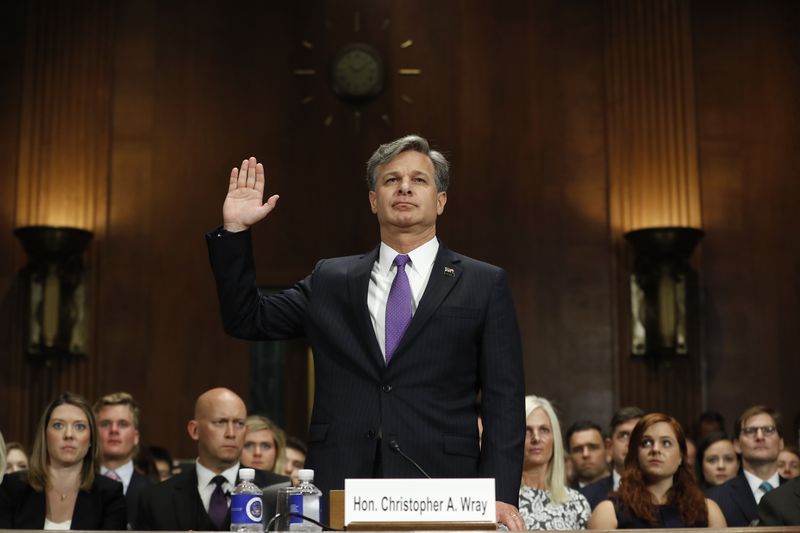2:08
The Senate Judiciary Committee hearing on the nomination of Chris Wray to be director of the FBI has concluded.
1:53 p.m.
The chairman of the Senate Judiciary Committee said he expected a decision soon on Wray’s nomination to be the next FBI director. Throughout the questioning this morning and afternoon, committee members made comments that suggested his approval was certain.
1:49 p.m.
Sen. Amy Klobuchar, D-Minn., changed the subject from Russia and FBI independence to bring up the topics of opioids and sex and human trafficking.
1:30 p.m.
Sen. Richard Blumenthal, D-Conn., asked Wray if he considered obstruction a serious crime.
“Absolutely,” Wray said.
Was lying to the FBI also a serous crime in his view?
“Absolutely.”
Then Blumenthal said he thought the president’s decision to fire James Comey because of the on-going investigation into Russian meddling in the 2016 election was obstruction.
“If that kind of crime has been committed you would investigate is seriously and diligently?” Blumenthal asked.
Wray said he would have to review the circumstances.
Blumenthal wanted assurances, one more time, that Wray wold be stand fast against political pressures.
"I see a fire storm brewing that would threaten the FBI,” Blumenthal said.
1:04 p.m.
Another recurring theme in the hours-long confirmation hearing is would Wray tell the Judiciary Committee if the White House or any other governmental agency asked him to stop or curtail a criminal investigation.
“I would report it where ever appropriate,” Wray said.
12:55 p.m.
Wray says he never regretted his offer to resign to support then FBI Director Robert Mueller and acting Attorney General James Comey amid a struggle with the Bush White House over extending a secret surveillance program.
12:49 p.m.
The Judiciary Committee has resumed its hearing.
12:33 p.m.
The Judiciary Committee has recessed for 10 minutes.
12:27 p.m.
Committee members continue to focus on concerns that politics could co-op the FBI.
“I want you to be A political,” said Sen. John Kennedy, R-La. “I don’t want you to exhaust yourself trying to make political friends up here. I want you to Socrates. I want you to be Dirty Harry with the bad guys. I want you to tell me how you’re going to do this in this atmosphere.”
Wray’s answer: “The process needs to have integrity. The process needs to be independent The process needs to be free from fear... free from partisanship.”
11:50 a.m.
Wray recalled advice from former Attorney General Griffin Bell that “you can’t do a job like this if you are not willing to quit or be fired” if asked to do something unethical or illegal.
“You have to stand firm to your principles,” he said.
He again repeated that his loyalty was to the U.S. Constitution and the law and not to any individual.
11:45 a.m.
Committee members repeatedly came back to the topic of loyalty: had anyone asked Wray for his loyalty.
“No one has asked me for a loyalty oath nor would I offer one,” he said.
He also said he was among those who planned resign during the Bush Administration in a dispute over a secret, wire taping program.
Wray said he did not know the confidential details in a memo to extend the program but he knew those in the Justice Department who were and were willing to give up their careers.
“Knowing those people and knowing they were hardly shrinking violets in the role of fighting terrorists,” Wray said, he was willing to join them if they resigned from the Department of Justice.
11:15 a.m.
Sen. Lindsey Graham of South Carolina was more aggressive in his questioning of Wray, often cutting him off before he could complete his answers.
Wray said he has no reason “to doubt the findings” of various intelligence agencies that the Russians attempted to interfere with the 2016 election.
He said any campaign offered information by a foreign entity that would hurt a political opponent should notify the FBI.
He would not have given a news conference announcing the end or the resumption of an investigation as former FBI director James Comey did in regard to a probe of former Secretary of State Hillary Clinton’s handling of classified emails.
“I don’t consider director Mueller to be on a witch hunt,” Wray said when asked about the president’s description of the investigation into Russian meddling.
Graham closed with an endorsement.
“From my point of view, you are the right man at the right time,” the South Carolina senator said.
10:52 a.m.
Democratic Sen. Patrick Leahy of Vermont asked Wray what he would do if the president asked him to do something “unlawful or unethical.”
“First I would try to talk him out of that and if that failed I would resign,” Wray said.
He also said he believed reports that Russia had tried to interfere with the 2016 presidential election.
10:40 a.m.
Sen. Dianne Fienstein asked Wray for assurances he would tell the Judiciary Committee if he learned of any efforts to interfere with the investigation of special counsel Robert Mueller into Russian interference with the 2016 election.
Wray assured her he would if there were no legal impediments.
Credit: Pablo Martinez Monsivais
Credit: Pablo Martinez Monsivais
10:32 a.m.
“In my view, torture is wrong, is unacceptable. It’s illegal, and it’s ineffective,” Wray said when Feinstein asked about his position on enhanced interrogation techniques.
10:20 a.m.
The continuing theme in the confirmation hearing of Chris Wray is the independence of the FBI director.
“If I am given the honor of leading this agency, I will never allow the the FBI’s work to be driven by anything other than the facts, the law and the impartial pursuit of justice,” Wray said. “My loyalty is to the constitution and to the rule of law. Those have been my guideposts through my entire career.”
He continued: “I believe to my core, that there is only one way to do this job and that is with strict independence. Anybody who thinks that I would be pulling punches as FBI director sure doesn’t know me well”
10:13 a.m.
Chris Wray began his opening statements in the confirmation hearing for his nomination to become the next FBI director by recognizing his wife, children and other family members there is support of him.
10:10 a.m.
Former U.S. Sen. Sam Nunn, introducing Wray, said he would be independent.
“Chris Wray possesses an unwavering commitment to the rule of law. He has a proven track record of following the facts and the law,” Nunn said.
Wray is loyal “to the Constitution, our laws and our nation and not to any particular office holder,” Nunn said, referencing Comey’s claims that Trump pressed him for his loyalty to the president.
10 a.m.
Democrat Sen. Dianne Feinstein of California, noting that Wray had offered to resign during a standoff with the administration with President George Bush’s White House over a secret surveillance program, wanted to know Wray’s opinion of some interrogation techniques from that time.
“There are those who will bring back torture if they could,” she asked.
In her opening statement, Feinstein said there were questions about what Wray knew about the interrogation techniques used at the prison in Abu Ghraib in Baghdad.
9:50 a.m.
Grassley told Wray he wanted assurances he would protect FBI whistle-blowers.
"There are still a lot of problems with the whistle-blower protection process,” Grassley said. “FBI whistle-blowers need the support of their leadership to ensure that there is a speedy and effective way to resolve their cases. I’d like an assurance from Mr. Wray that whistle-blowers will not face retaliation. Some of his predecessors have done a poor job of protecting whistle-blowers.”
He then criticized the former FBI director, James Comey, whom President Donald Trump fired because of the ongoing investigation into Russia’s meddling in the 2016 presidential election.
He then yielded to the ranking Democrat on the committee, Sen. Dianne Feinstein.
She immediately turned to the controversy around Comey’s firing.
9:35 a.m.
Atlanta attorney Chris Wray has taken his seat in the Senate Judiciary Committee meeting to begin his confirmation hearing.
Chairman Chuck Grassley of Iowa began by welcoming Wray, who will be introduced by former Georgia Sen. Sam Nunn, who is also a partner at the law firm where Wray is a partner, King & Spalding.
In his opening comments, Grassley praised Wray for his reputation, his legal career and “commitment to independence.”
“He’s prosecuted little guys and big guys, including a major league baseball player, gun-traffickers and RICO violators,” Grassley said. “He’s prosecuted folks on both sides of the political spectrum, including folks working on a Republican campaign. While at the Department of Justice, he oversaw the task force that investigated Enron.”
Original story:
President Donald Trump’s pick to lead the FBI, Atlanta attorney Chris Wray, appears before the Senate Judiciary Committee on Wednesday.
WATCH: What you need to know about Christopher Wray
If confirmed, Wray, 50, would follow in the footsteps of James Comey, who was fired as he investigated possible ties between Trump’s presidential campaign and the Russian government.
The hearing is set to begin at 9:30 a.m. Follow live developments here.
About the Author







